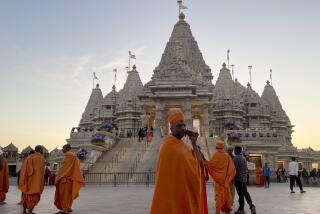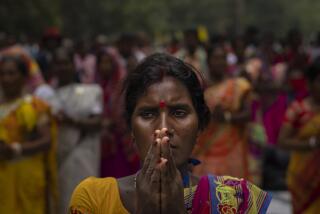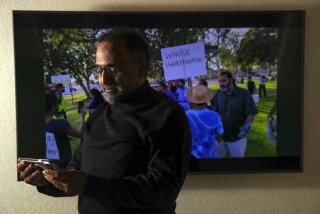Bit of India Finds Home in Heartland
- Share via
WORTHINGTON, Ohio — As Dilip Doshi watches his son get ready for the prom, he sees an American style mixing with his own culture of India.
The young man is a singer in a rock band, sporting hair dyed blond and pulled into a ponytail. He is looking forward to a night of dancing with friends, but before he leaves he will go to the shrine in his home for prayer.
Doshi and his son, Sagar, are adherents of Jainism, a religion rooted in the distant past. Its followers believe in nonviolence. They also believe all souls are equal, from microorganisms to humans.
Fewer than 12 million of India’s 1 billion people practice Jainism. There are even fewer in central Ohio, where the majority of the 2,000 families from India are Hindu.
But all the families struggle to foster conservative mores in children growing up in America’s freewheeling environment.
“I am sure he watches some movies that show fighting,” says Doshi, 52. “Ultimately they have their own minds, and you can’t control everything they do in life.”
Sagar, 17, offers reassurance: “I am old enough to see what is there and make my own decisions, and that comes from a strong base of culture and religion.”
Even though Sagar’s American friends don’t share his beliefs, he believes they respect the way he tries to live. He follows a vegetarian regimen and doesn’t drink, but then, he says, neither do most of his friends.
Classmates ask about his medallion, which resembles a swastika. “A family heirloom that stands for peace and prosperity,” he tells them.
Sagar is grateful for his cultural connection to India--a strong sense of heritage that his American friends often lack. “That,” he says, “just makes me want to get more in touch with my roots.”
“All my closest friends understand what it is I am doing,” he says. “My religion is based on nonviolence. It is not just physical violence I oppose, but also mental and emotional violence.”
But Indian families can be undermined by American violence, says Balabhadra Costain, who has a PhD in applied Jainism.
“Indian families have to be very vigilant about losing what they call in India ‘sweetness,’ ” he says. “And it is the practice of the religion that is keeping that intact.”
Costain, a native of Canada who became a Jain in 1983, cited such sweetness as one of “the benefits of Indian culture.” He now instructs 78 families at a Jain temple tucked into an office building in Columbus.
Many Indian children in America have a hard time absorbing Jain’s gentleness into their personalities, says Costain. “That could be their karma or the influence of their environment.”
Like most families, Doshi’s draws strength from home, where he tries to lead by example, as he was led by example. But parental guidance--even for arranged marriages--can be tough.
“To the kids, it’s often a bunch of mumbo-jumbo,” says Doshi. “Living in this logical society, they are always asking why.”
But he won’t punish Sagar for adopting American traits. “I could never raise a hand to my son,” says Doshi. “He could have been my father in a previous life.”
Like Hindus, Jains believe that souls are reincarnated when bodies die. Jains believe in independent souls; Hindus believe all souls are one spirit.
In 1994, a Hindu temple was built 13 miles northwest of Columbus. Set on acres of farmland with few homes, the multimillion-dollar structure brings together Indian families.
The temple, with six shrines, serves 1,650 Hindus. Some travel many miles but worship as individuals, not as a congregation. Every day, priests wash and dress the images of the divinities and bring them food.
Sree Aswath, who teaches scripture and Hindu heritage at the temple, sees some initial resistance to rituals. But eventually the children even adhere to a traditional dress code, with a ritual that he sees as “transforming themselves from the mundane to the sacred.”
“When we reveal the beauty of the knowledge,” adds Aswath, “that is self-discovery. Then immediately their interest is kindled.”
More to Read
Sign up for Essential California
The most important California stories and recommendations in your inbox every morning.
You may occasionally receive promotional content from the Los Angeles Times.













